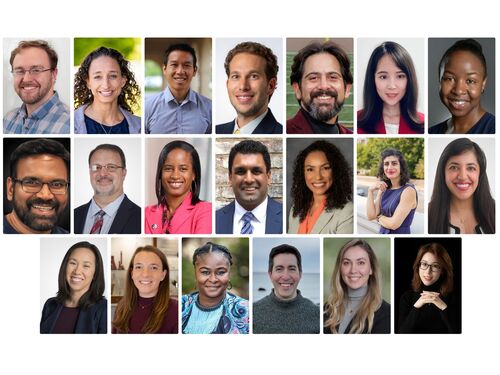To Increase Confidence in COVID-19 Vaccines, Decision-Makers Need to Showcase Public Support, Leverage Endorsements, Focus on Hesitant Individuals, and Engage Communities
News Release
By Megan Lowry
Last update February 3, 2021
WASHINGTON — Decision-makers leading COVID-19 vaccine rollouts need to begin communicating with the public immediately if they have not already — emphasizing public support for vaccinations, leveraging celebrity and community champion endorsements, and focusing on those who are skeptical or hesitant of the vaccines rather than firmly opposed — to ensure demand and promote uptake, says a new rapid expert consultation from the National Academies of Sciences, Engineering, and Medicine. Strategies for Building COVID-19 Vaccine Confidence says attitudes are hard to change once formed, so immunization programs need to develop their communication strategy immediately in order to have an impact while people are still forming their opinions about the vaccine.
Special efforts to reach the most vulnerable, namely Black, Latino, and Native American communities that have experienced far higher COVID-19 mortality rates, are critical. The consultation says that community engagement is key to overcoming mistrust and building confidence through actions like using many channels of communication, engaging trusted messengers with roots in the community, and working toward racial equity.
The rapid expert consultation says reaching those who are hesitant or skeptical will be most effective in increasing uptake, rather than reaching the small minority of people who are already adamantly opposed to the vaccine. Reasons for vaccine hesitancy vary widely. While some want to wait and see how others respond to being vaccinated, others are mistrustful of medicine or government. Some mistrust is rooted in experiences of systemic racism and discrimination. Conflicting information from multiple sources can also undermine confidence and trust in vaccine authorities.
To build confidence in COVID-19 vaccines, the rapid expert consultation says decision-makers at all levels can:
- Allow and encourage public ownership of COVID-19 vaccination. Actions like establishing local oversight committees, implementing bottom-up approaches, and listening to feedback and adapting accordingly can engage the public and inspire greater confidence in the vaccine.
- Emphasize support for vaccinations, rather than focusing on naysayers. Making increased support for and uptake of COVID-19 vaccines more visible — such as by distributing “I got vaccinated” stickers or posting real-time data about how many people have received the vaccine — will encourage its acceptance by others.
- Leverage trusted vaccine endorsers. Immunization of and endorsement by relatable and trusted celebrities and community champions can encourage the public to get vaccinated. For example, NBA star Stephen Curry hosted Anthony Fauci on his video series to talk about the vaccine, how we know it’s safe, how it was developed so quickly, and how it will be distributed. Well-known local champions, such as faith leaders or business owners, can set vaccination as the norm among their parishioners or customers.
- Pay attention to delivery details that also convey information. If the experience of getting the vaccine is negative — for example, if online sign-up portals crash, clinic sites are dirty, or people wait a long time at a vaccination site — the public may infer that the vaccine itself is faulty.
- Respond to adverse events in a transparent, timely manner. Help people understand what is known and unknown about side effects and rare adverse outcomes to the vaccine, and what they should do.
- Meet people where they are and don’t try to persuade everyone. Don’t focus resources on trying to persuade the small portion of the population that is completely opposed to vaccination. Instead, use empathy to reach those who are hesitant or skeptical.
- Avoid repeating false claims. Efforts to debunk misinformation can have the unintended effect of reinforcing false beliefs. Instead, emphasize the facts. Avoid treating skeptics as the “other” or adopting a “those people” mentality.
- Form partnerships with community organizations. Local governments can use existing relationships with community organizations such as neighborhood coalitions or faith-based networks to promote the vaccines. These organizations are closer to their audiences, are already adept at tailoring information, and have trusted leaders.
- Adapt messaging as circumstances change. What influences someone’s vaccine decision now is likely to change as distribution, knowledge about the virus, infection rates, and media coverage change.
- Tailor messages to specific audiences. Vaccine communications need to reflect the intended audience’s specific concerns, motivations, and who they trust. Make language accessible and jargon-free.
Undertaken by the Societal Experts Action Network, the rapid expert consultation was sponsored by the National Science Foundation and the Alfred P. Sloan Foundation, and conducted in collaboration with the Standing Committee on Emerging Infectious Diseases and 21st Century Health Threats, which is sponsored by the U.S. Department of Health and Human Services, Office of the Assistant Secretary for Preparedness and Response. The National Academies are private, nonprofit institutions that provide independent, objective analysis and advice to the nation to solve complex problems and inform public policy decisions related to science, technology, and medicine. They operate under an 1863 congressional charter to the National Academy of Sciences, signed by President Lincoln.
Contact:
Megan Lowry, Media Officer
Office of News and Public Information
202-334-2138; e-mail news@nas.edu
Building Parents’ Confidence in COVID-19 Vaccines
Women’s Participation in the Post-COVID Workforce
Strategies for Schools to Support Student Mental Health
Social Science Insights on Communicating COVID-19 Vaccine Efficacy and Equity
Featured Publication
Strategies for Building Confidence in the COVID-19 Vaccines
Rapid Expert Consultation
·2021
Ensuring strong demand for and promoting acceptance of the COVID-19 vaccines is critical to achieving herd immunity, protecting the most vulnerable populations, and reopening social and economic life. People who are hesitant, reluctant, distrusting, or otherwise not motivated with respect to being v...
View details
More like this
Discover
Events
Right Now & Next Up
Stay in the loop with can’t-miss sessions, live events, and activities happening over the next two days.
NAS Building Guided Tours Available!
Participate in a one-hour guided tour of the historic National Academy of Sciences building, highlighting its distinctive architecture, renowned artwork, and the intersection of art, science, and culture.



